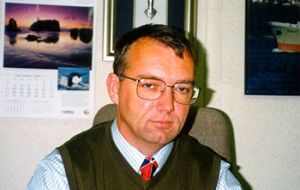MercoPress. South Atlantic News Agency
”Old fishing law needed updating,' says Falklands' Fisheries Director
 Falkland Island Fisheries Director John Barton said several reasons prompted the establishment of a fishery rights system.
Falkland Island Fisheries Director John Barton said several reasons prompted the establishment of a fishery rights system. Government representatives from Argentina and the United Kingdom met in Buenos Aires during 14 - 15 March to analyse activities of the South Atlantic Fisheries Commission (SAFC), a request for bilateral co-operation favouring the conservation of fishing resources in that region.
"An agreement was not reached, it was only an informal meeting to discuss fishery issues," on the Falkland Islands, said John Barton, Director of the Falklands Islands Fisheries Department to FIS.com, during an exclusive interview held after the diplomatic meeting. Barton was one of the members of the British delegation that participated in the bilateral talks. This is not the first time both parties try to grant a mandate to the SAFC. Between 6 - 7 September, 2006 the parties met in London, without reconciling differences. Differences arose between Argentina and the UK in 2005, when the Government of the Falkland Islands decided to grant fishing rights for 25 years, as of July 2006, to companies which employ Falkland citizens. Argentine authorities considered this decision an illegitimate unilateral action, unfavourable to fisheries resources in the area. Argentina's Ministry of Foreign Relations, International Commerce, and Culture claims the measure adopted is "a form of long term illicit and unilateral provisions". Furthermore Argentina argues that "it contradicts Resolution 31/49 from the General Assembly of the United Nations (UN)which calls on both sides to abstain from adopting unilateral modifications on these issues, while the Islands are in the process of de-colonisation recommended by the resolutions of the General Assembly." Barton explained that the Falklands new rules establish a system of fishing rights or individually transferable quotas (ITQ), acquired by the companies and which later can be commercialised to other companies settled in the area. Generally, these companies work jointly with companies from other countries, particularly Spain and Korea. The director of the Falklands Fisheries Department told FIS.com that "for many reasons" fishing rights system was modified. "The old fishing law in the Islands had been in existence since 1986, and many things have changed over the last 20 years," he pointed out, "making it necessary to renovate, modernise legislation, to adjust to new circumstances in the international fishing arena." According to Barton, the ITQ system, "is better and more efficient for the companies; in the case of short term licenses the companies did not know if next year they would be able to continue fishing in the zone, or if they would be able to invest in new vessels," without warranted rights for fishing in Flaklands waters. "This new system offers companies more security," added Barton. He said that the governor of the Islands still has "complete control over conservation issues pertaining to fishery resources of the zone." He also announced that in the near future 15 companies would be operating in the Falklands. Regarding the transfer of fishing quotas, the Falklands' official explained "it is necessary for companies to qualify beforehand, they are non-transferable to any company. They must be headquarted in the Falkland Islands" which are controlled by local fisheries authorities. When asked about the possibility of the Argentine Government approving a bill targeted to eliminate so-called "double permits", and thus not allowing companies to simultaneously make use of fishing licenses granted by Argentina and the Falkland Islands, Barton responded "that depends on them [the Argentines]." "It is probable it will impact the companies that want to invest in Argentina," he said, but "it would not have a negative impact on the Falkland's economy." Another Argentina/UK meeting is forecast in six months with London acting as the host since meetings alternate between the two nations. The main resources caught in Falkland waters are Argentine short-fin squid (Illex argentinus), which represents 49% of total catches and Patagonian squid (Loligo spp), which represents 23%, and toothfish Dissostichus eleginoides). The main markets for these products are European countries and Southeast Asia. According to reports from the Falkland Islands Fisheries Department,in the Janâ€"Dec 2006 period, catches landed in the Islands totaled 128.684 tons of squid, 85.616 tons of Illex and 43.068 tons of Loligo. (FIS/MP)




Top Comments
Disclaimer & comment rulesCommenting for this story is now closed.
If you have a Facebook account, become a fan and comment on our Facebook Page!